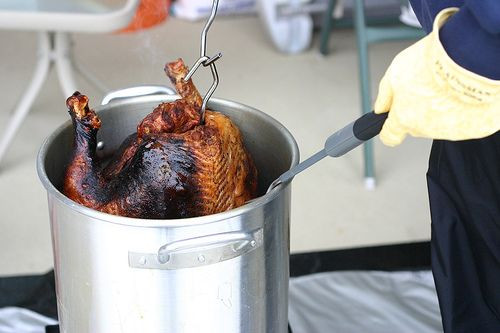Deep Frying Your Thanksgiving Turkey? How To Avoid Lighting Yourself On Fire This Holiday Season

What a damper on the holiday it’d be, seeing a relative accidentally catch fire while lowering the Thanksgiving turkey into the deep-fat fryer. Or imagine the embarrassment of leaving your own family behind, as you take an expensive trip to the local burn unit. Deep frying a Thanksgiving turkey can be incredibly dangerous, but it can also be equally delicious, so consider a few words of wisdom to ensure you spend your holiday experiencing less of the former, and more of the latter.
There are two main hazards to consider when deep frying a turkey. You’ll either overfill the drum with oil, and an avalanche of flames will pour out because you’ve displace the oil’s volume. Or you’ll forget to let the turkey thaw and drop a frozen, water-packed bird into 350-degree oil, introducing flammable oxygen and hydrogen into the tank and sending a tower of fire shooting from the fryer. The steps to avoiding these catastrophes are simple, yet they could end up saving you precious, healthy layers of skin, and thousands of dollars in home reconstruction.
"First and foremost, people have to realize that the deep-fat fryers are just inherently dangerous," John Mulhall, spokesman for Orange County Fire Rescue, told the Orlando Sentinel. "You're looking at gallons of a flammable oil that could just as easily spill and burn someone as start a fire."
Two Mistakes
An easy, effective way to ensure you don’t overfill the container is to measure the appropriate oil line with water beforehand. Drop the bird into the empty tank and fill it with water, until the level rises to the fryer’s designated mark. Then remove the turkey and mark the water level. When you go to cook the turkey, you’ll have a safe, predetermined guideline.
The other risk people often run, is dropping an unthawed turkey into hot oil. The danger here is effectively the same as a small-scale grease fire in the kitchen, except it isn’t several cups of oil igniting from a splash of water, but several gallons of oil erupting from a turkey densely packed with moisture. Tommy Steen, a veteran firefighter with the Rankin County Emergency Operations Center in Brandon, Miss. told Fox News that “99.9 percent of the time you can pull this off without a problem, as long as you do it right.” Unfortunately, it’s that 0.1 percent that really matters.
“Depending on the size of the turkey, it could take up to three or four days in your refrigerator from solid frozen to ready to go in fryer,” Steen explained. Ultimately, the goal is keep the turkey as dry as possible, so that any residual moisture doesn’t come in contact with the oil.
The National Fire Prevention Agency (NFPA) states that it “discourages the use of outdoor gas-fueled turkey fryers that immerse the turkey in hot oil.” The large quantities of combustible cooking oil, if not handled properly, “can lead to devastating burns, other injuries, and the destruction of property.” Between 2007 and 2011, there were 927 fires resulting from non-contained deep fryers. This accounted for 35 civilian injuries and $44 million in property damage, according to NFPA figures. There are three times the number of home cooking fires on Thanksgiving than on any other day of the year.
Less-Than-Happy Thanksgiving
One such injury happened to Serafino Alfe. Two years ago, he suffered third degree burns after tripping over a turkey fryer and spilling burning hot oil onto his leg. He spent three weeks at the Loyola Burn Center in Chicago, and still suffers from nerve damage, WCSH6 reports. "The nerves are gone,” said Alfe. “They're shot.”
But the greatest advice to ensuring a safe frying experience is perhaps also the most obvious: do it outdoors. And not on a deck or patio — do it far away from anything that could potentially catch fire. “Don’t do this in your garage; don’t do this on your wooden deck. If you’re going to do it, do it out in your yard away from anything that’s flammable that could catch on fire,” Steen said. “And by all means, do not attempt to deep-fry a turkey with this type of cooker inside your house.”
Published by Medicaldaily.com



























